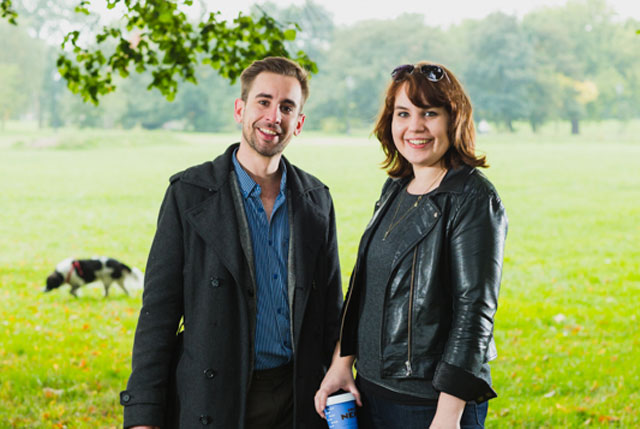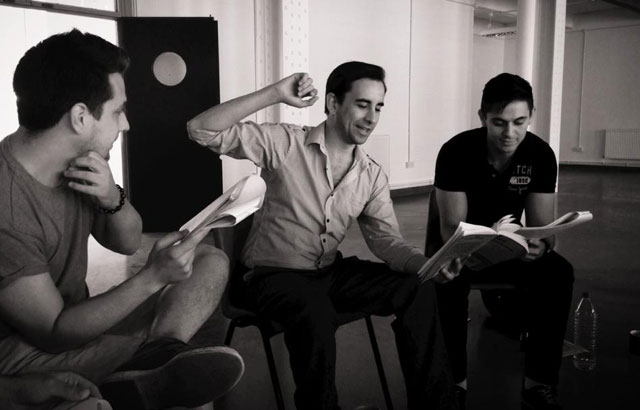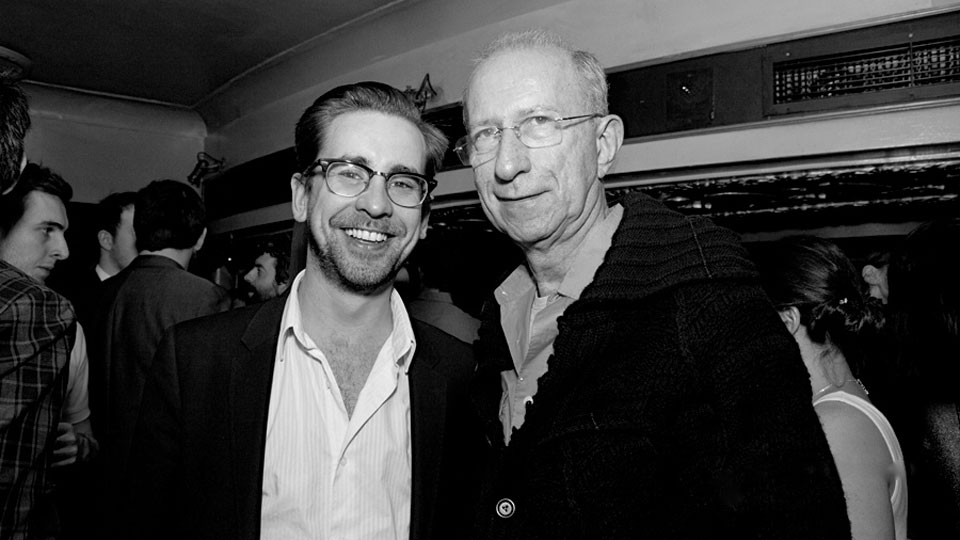Andrew Keates is a multi-award winning director of productions such as Bent, Just So, The Hired Man, The Thing About Men, A Winter’s Tale and As Is. He co-ran the Landor Theatre for over three years until 2012, when he set up his own company, Arion Productions.
His acclaimed production of Martin Sherman’s Passing By will be revived for the Tristan Bates Theatre, starting 5th November, starring James Cartwright and Rik Makarem.
We recently caught up with him for an exclusive in-depth interview. In this third and final part we come up to date with Andrew’s career. We learn about how he came to stage Bent and the collaboration that developed between him and playwright Martin Sherman (pictured above, with Andrew). He also tells us about the ambitions he has for his company Arion Productions; and we find out about his latest show, Sherman’s Passing By, which opens at the Tristan Bates Theatre next week.
Where do you see your career going next?
Wherever I can tell honest, challenging and important stories to audiences that want to experience them. I could list a whole directory of theatres I want to work in, but when it comes to getting a job, seldom are you the one in control of getting it. For me it’s all about the work. Whether that is in a venue like the Finborough or The Cottesloe.
You co-ran The Landor Theatre for three years. Tell us about that.
It was the best three years of my life. The Landor’s artistic director, Robert McWhir, gave me the greatest opportunity a young director could ever have asked for; to be his theatre manager and artistic consultant. Now that sounds like a very grand, glamorous role. However, we’d both be found working 12 hour days, 7 days a week and fulfilling the responsibilities that most theatres would have an army of staff to do for little to no money. We’d go from producing ambitious shows to cleaning toilets. I have never worked harder and reaped so many rewards than when I was there. I really believe that the three years of Rob and I working together, during such ambitious shows such as Bent, Ragtime, The Hired Man, The Glorious Ones and Curtains were the truly golden years for the Landor. I still miss Rob and the Landor terribly, however I didn’t want to become tied to one venue. But, I still pop in regularly and find myself resisting the urge to hoover the carpets or jump in the box office. The theatre is still in very safe hands with Rob. He is the soul of the venue.

What made you set up Arion Productions and what’s the artistic vision?
Whilst I was at The Landor, I met one of the most generous men I have ever met. His name is Andrew Harmer. We both share a passion for telling great stories and giving opportunities to creative folk. So after co-producing The Thing About Men, we decided to set up Arion Productions Ltd together. We were hungry for more and we wanted to work at so many other venues with a creative ethos that we both shared. He is one of the only men on this planet who can keep me grounded and on track! He must receive over 50 e-mails a day from me. He is a saint.
So we set out with three clear goals: i) to create works based entirely on their artistic merit alone. We were fed up of the prejudices that come with labels like ‘gay plays’ or ‘musicals’. If the work was well crafted, then we wanted to produce it, regardless of its form and genre. ii) We wanted to help with the development of actors; and not just new graduates, but actors who had for one reason or another been forgotten about. We’ve worked with Olivier Award Winners who feel like they’ve been put on the scrap-heap. iii) Lastly, we wanted to help encourage new creative/production team members. It’s always difficult getting for an actor getting their first break, but I think it’s even harder for the next generation of lighting designers, sound designers, casting directors or indeed any creative/production roles. At Arion it’s always about doing great work with great people.
You had great acclaim early on as a director for a revival of Martin Sherman’s Bent. Tell us about that.
Bent was my first show at The Landor and it was that production which really put me on the map as a director. I was only 24 and I said to Robert McWhir, “I really want to do Bent.” Rob laughed and said, “You’ll never get the rights.” Bent was famously very hard to get back then. So, I sent an email to Casarotto Ramsay, the rights holders, saying I wanted to do it. I got a phone call back, saying, “Doesn’t everyone?!” I said, “If I send an email, would you mind forwarding it on to Martin Sherman for me? I really think I can do something special with this play.” I sent my vision for the show and why I wanted to do it, including how important it had been to me on a personal level. I mean, I’d been thinking about it for nearly ten years! Then one morning my phone went; I croaked a hello, then this voice says, “Hi, it’s Martin Sherman.” I nearly threw my phone halfway across the room. It was like Oscar Wilde calling out of the blue. Martin and I ended up chatting for a while about all kinds of things and we decided we should meet at Joe Allen. Since that night we’ve been extremely close. To think that when I was 13, struggling with my sexuality; his play changed my life. Then at 24 the same play formed the foundation of my reputation and career. I owe him so much and it’s such an honour to have him as a mentor and friend.

You’ve done Sherman’s Passing By too, which is about to be restaged at the Tristan Bates Theatre.
I wanted to direct Passing By because of its nature. It’s not political. It’s not in-your-face. It’s a brilliantly written, honest, gentle, quirky love story that happens to be between two men. I think it’s one of the most ground-breaking plays of its time. I also think it’s one of Martin’s best works.
In 2012, we revived it at the Finborough Theatre with Steven Webb and Alex Felton. It totally sold out. What I found so rewarding was how many young people enjoyed the production. The play was over 30 years old. Yet, it seemed like a brand new play for our time. I think that comes down to Martin’s original vision, to tell an honest love story with no agenda. It’s a sign of our changing times.
Shortly after the production, Methuen published Martin Sherman: Plays 2, which includes Passing By and a foreword from Martin about our production. It’s one of my proudest achievements. We’ve just received Arts Council funding for it to be restaged at the Tristan Bates Theatre right opposite Old Compton Street this November for four weeks in the heart of the gay capital of this country. I’m in rehearsals now and I think it’s going to be just as wonderful at the Tristan Bates as it was at the Finborough.
Are there other pieces by Martin Sherman that you would like to direct?
All of them! I say that in all seriousness. It’s my intention by the time I’m old and gray to have directed his complete works. Some directors are obsessive about Ibsen, Chekhov and Shakespeare. I’m obsessed with the works of Martin Sherman.
Tell us about casting Passing By?
For the original production, I had Steven Webb play Toby, who I’ve worked with on several other occasions. He’s one of my favourite people in the world. In fact, it was getting to the point where every time I’d announce which show I would be directing next, quite a few people would just assume that Stevie would be in it. I think he’s a star. I mean that. And for the role of Simon, I had an exquisite actor called Alex Felton; funnily enough when Alex was a Drama Centre, he had Simon Callow as his mentor, who had played Toby in the original Gay Sweatshop production. There’s something scintillating about how life can go full circle.
Anyway, once we had confirmed transferring Passing By to the Tristan Bates, both Stevie and Alex were unavailable due to work commitments. So for only two roles, we went into auditions for nearly three weeks and found ourselves sat in the finals with a group of London’s finest actors. So many people wanted to do this show. But, two actors really stood out in how they worked together.
Our new Toby will be played by Rik Makarem. He has such a likeable and sensitive nature. He must be one of the hardest working actors I’ve ever met. He doesn’t give himself a break until he’s found every drop of potential in his work. He’s so hungry for perfection. I’m not someone who watches a lot of television, so it was really lovely to just meet him as a new actor – then discover quite how much he has done in television, such as Emmerdale and Torchwood.
And our new Simon will be played by James Cartwright. James is a little bit different to Rik, in that I had actually seen him before in his father’s play, The Rise and Fall of Little Voice at the Vaudeville Theatre. I really liked his choices and I was very excited to meet him in person during the audition process. Again, like Rik, James has done so many wonderful things in his career and I know audiences are going to fall in love with the two of them.
They’re rascals. They’re two Northern lads who are constantly bantering and playing with each other. There’s never any ego in the rehearsal room; just an intense desire to serve the piece. Someone said to me the other day, “they new Toby and Simon have got big shoes to fill”. I said that wasn’t the case at all. They’ll make their own shoes.

Any dreams left to fulfil?
To work in the places that have always inspired me, such as our National Theatre, The Royal Court, The Globe, Young Vic and The Donmar Warehouse. There are also so many regional theatres that I’m hungry to work at, such as West Yorkshire Playhouse, Salisbury Playhouse and Sheffield Crucible. They’re the workhouses of theatre. But whether I’m lucky or not to work in these places I still don’t think I’ll ever be ashamed to say I started on the fringe. Other than my career; well a husband and dog would be nice. Oh, and I’ve never been to Broadway. I can tell you the name of pretty much every theatre and what’s played in them. But I’ve never stepped a foot on American soil. Still, there’s plenty of time. I hope.
What do you do when you’re not directing?
Sleep! And I spend as much time as I can with my family and friends. I do all the things I did as a kid – I enjoy a duvet day, reading, cooking, obviously going to the theatre and cinema, I love going to exhibitions, galleries and museums. I also love an adventure; just jumping on the tube to somewhere and seeing where I end up.
What’s after Passing By?
I’m in discussions about a few other projects at the moment, but sadly I’m sworn to secrecy as to what they are. However, there will be plenty more shows from Arion and the other companies I work with. I’m also continuing to teach as much as I can. It’s something I’m really passionate about. Also, I’m finally planning on having a holiday! The last time was about three years ago when I was working on Just So and got to spend a few days at Anthony Drewe’s farm-house in France. It was bliss.
Do you have any advice for youngsters who might be on a similar journey to you and want to get into the theatre?
Remember that there are very few careers where you will face rejection on a daily basis. Fundamentally as human beings, all we want to do is what we want. We have to be responsible enough to understand that rejection is part of the job – whether you’re an actor, director, producer. But if you are relentless and you can treat each failing as a way to better yourself, and self-analyse and ask where something went wrong – then you’ll develop the skills to go further. Another thing that’s vital is to make sure you have things in place to learn: go to the theatre, go to classes, meet people. John Gielgud took voice lessons up until the age of seventy-five. If he could still learn, anybody can and should. The thing I hate about this industry is there is an overwhelming sense of expectation and desire of failure, and that’s very difficult to cope with. Don’t forget that you’re putting your work on a stage for people to judge: don’t be surprised when they judge it! Art is however anyone perceives it. Just know within yourself if you’ve served it to the best of your ability. If you can say that you have, it can’t hurt you.
Thank you for talking to us, Andrew Keates.
My pleasure. Thank-you for listening.
You can see Andrew Keates’ transfer production of Passing By at the Tristan Bates Theatre near Covent Garden from 5th to 30th November. You can book tickets by visiting the Tristan Bates Theatre website.
For more details about the work of Andrew Keates, see his website.



